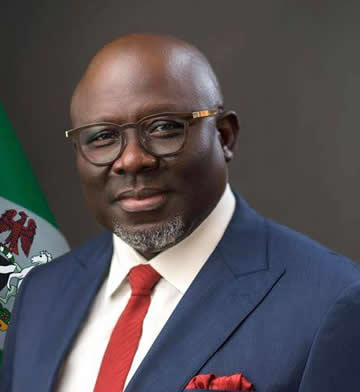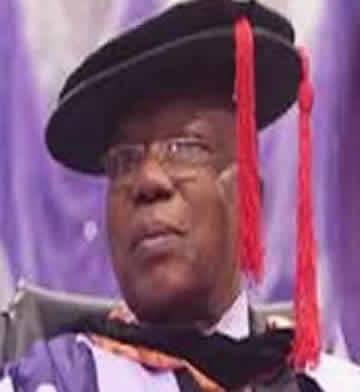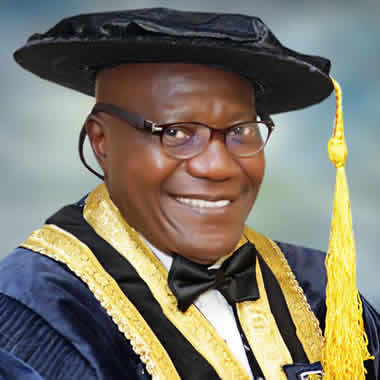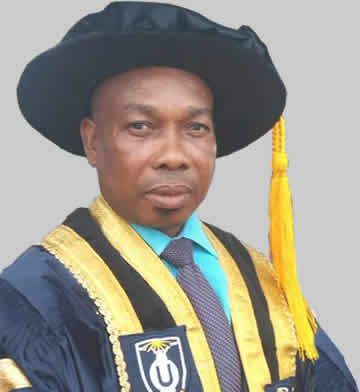


Greetings and welcome to the official website of the University of Delta. As the Vice-Chancellor of this great Institution, I am honoured to extend my warmest greetings to you all.At the University of Delta, we pride ourselves on providing excellent education, shaping future
leaders, and promoting national development. As a world-class institution, we are committed to providing a conducive learning
environment that fosters academic excellence, innovation and creativity, research and development, and community service. Our faculty members are highly qualified and experienced, dedicated to imparting knowledge and skills to our students to become well-rounded individuals who can contribute positively to society. Our curriculum is designed to ensure that students are nurtured to meet the challenges of the ever-changing global landscape. Our state-of-the-art facilities, including modern lecture rooms, well-equipped labs, sports facilities, comfortable hostels, and modern libraries, provide our students with the best learning experience, creating a wholesome learning environment.Furthermore, we have a vibrant student community where students have access to leadership opportunities, sporting activities, cultural events, and social activities. If you are an individual who values academic excellence, leadership, and community service, then the University of Delta is the perfect place for you. We invite you to explore our website, and it is my pleasure to welcome you to our community. Professor Stella Chinye CHIEMEKE KSM, FNCS Vice-Chancellor |
 Prof. Stella Chinye CHIEMEKE KSM, FNCS Vice-Chancellor Prof. Stella Chinye CHIEMEKE KSM, FNCS Vice-Chancellor |
 Rt. Hon. (Elder) Sheriff F.O. Oborevwori Visitor/Executive Governor, Delta State |

Emeritus Prof. E. A. C. Nwanze Pro Chancellor/Chairmain Governing Council |

Prof. (MRS.) Stella C. Chiemeke, (KSM, FNCS) Vice Chancellor/CEO |
 BARR. RICHMOND OMAGBEMI (Esq) Registrar |

Ikeogwu Sunny Bursar |

DR. (MRS )VERA N. OKONOKO) Librarian |
The old Bendel State Government had established some tertiary Institutions across the State including the College of Education, Agbor which was established in 1980. With the split of the then Bendel State into Delta State and Edo State in the 1991 State creation exercise, the College now became College of Education, Agbor, Delta State. The College, located in a serene and academic friendly environment in Agbor, the administrative Headquarter of lka South Local Government Area of Delta State, was founded to train students to become excellent teachers who will make impact in the Nigerian Education sector. The College had no religious affiliation and admitted students from different parts of the country thus, leading to a large and diverse student body. The College offered programmes across Agriculture, Sciences, Humanities, Social Sciences & Management and provided her students with facilities to create a comfortable learning environment.
The profile of the College rose such that it did not only become a highly desired citadel of learning but a Study Centre of Excellence both in academics and discipline. Consequently, there was great quest for studentship admission into the College beyond the confines of the State. The quest was so irresistible that the tempo of study and studentship became non-restrictive. As the students were learning, so their lecturers were burning their midnight oil, not only to better their educational attainment, but also to impart the desired quality education that would continue to raise the academic and moral standards of the Institution to an enviable height. Noticeably, most of the lecturers who came into the College with first degree saw the challenge to garner their Doctor of Philosophy (Ph.D) degrees. The Institution then got the requisite approval to run degree programmes in affiliation with Delta State University, Abraka- an endeavour she has conducted creditably thus far. Recently, students who graduated from the DELSU degree programme in the Institution (College) were mobilised to participate in batch A, Stream 1 of the National Youth Service Corps (NYSC) and this development actually gave credence to the agitation for a university status to be conferred on the College.
Over time, however, it was discovered that the three Colleges of Education had a total combined student enrolment of less than two thousand (2,000) despite the enormous resources committed to their operation in terms of infrastructural and other facilities as well as human resources. The dwindling population was due largely to the fact that most candidates prefer to pursue a degree in Education as against National Certificate in Education (NCE). In fact, in one of the Colleges, the number of staff was more than the student enrolment. After reviewing the situation, the current Administration then thought that it would make more sense to convert one of the Colleges of Education into a University with the aim of shoring up the enrolment while putting the available human and material resources to better use. In the meantime, there had been recurring calls for a change of profile and subsequent upgrade of College of Education, Agbor to a degree awarding status even before the advent of the current political Administration in the State. The current Governor of Delta State, Dr. Ifeanyi Okowa then considered the glaring antecedents, indicators and parameters of College of Education, Agbor and decided to get the Delta State House of Assemble to pass the Bill for the conversion of the College to the status of a university. Consequently, he promptly signed the Bill into law in 2021, thus heralding the establishment of University of Delta, Agbor.
With the appointment of Prof Stella Chinye Chiemeke as the pioneer Vice Chancellor of the University in 2021, the erudite professor swung into action by inviting the National Universities Commission (NUC) for a resource visit to the University. The outcome was the approval of eight faculties for a start, four domiciled in the main campus in Agbor , two in Owa Oyibu campus and two in Owa Alero campus.
Faculty of Arts has eight programmes, Faculty of Computing offers four programmes, while Faculty of Education mounts twenty-two programmes. The Faculties of Engineering, Environmental Sciences and Science have six, five and twelve programmes respectively. Faculty of Management and Social Sciences runs twelve programmes, whereas the Faculty of Law has only one programme.
In the same year 2021, University of Delta advertised, screened, admitted students and debuted lectures for the 2021/2022 academic session in keeping with the vision and mission of the University. Not willing to waste time, by January, 2023, academic activities also commenced for the 2022/2023 academic session. Thus, in about two years Prof S.C. Chiemeke, in her competence, commitment and courage, has led University of Delta, Agbor to achieve such remarkable progress that one would think that the Institution has been in existence for more than a decade.
In the area of infrastructure, the University parades state-of-the-art facilities and resources, such as lecture classrooms with interactive boards, well-equipped Engineering workshops, a wonderful Entrepreneur Development Training Centre, beautiful lecture theatres, to mention but a few, all thanks to the provision of the proactive State Governor and Visitor to the University, Senator Dr Arthur Ifeanyi Okowa and the visionary leadership of the Vice Chancellor.
Being a pacesetter, the Vice Chancellor has, from the onset, incorporated Information and Communication Technology (ICT) into the available administrative and educational resources in the Institution. To this end, the University has a website, a Learning Management System and a portal system. As such, staff and students can conveniently collaborate with their peers in other Institutions. In fact, the ICT Directorate of the University has what is required to make the Institution one of the best globally.
Furthermore, as far as human resources are concerned, University of Delta showcases qualified, experienced and dedicated members of staff, with lecturers keying into the current trend of global visibility, poised to move with the chief executive in her giant strides.
